II. 2. NEGRO GAME SONGS
[In 1883 Newell published, Games and Songs of American Children, but not many people know about the extensive article by Babcock in 1886 on games of Washington (some African-American) children titled, Games of Washington Children (See my articles section for the article). Another directly related article in my article section is: Song-Games of Negro Children in Virginia by Mary Olmsted Clarke The Journal of American Folklore, Vol. 3, No. 11 (Oct. - Dec., 1890), pp. 288-290.
Lomax refers to Newell in one song, "Kitty, Kitty Casket" better known as "A-Tisket, A-Tasket."]
CONTENTS: II. 2. Negro Game Songs
Ladies in the Dinin' Room
You Turn for Sugar an' Tea
Johnnie Bought a Ham
Little Bird, Go Through My Window
Sally Go Round the Sunshine
Don't You Like It?
Cocky Doodle Doodle Doo
Kitty, Kitty Casket
II. 2. NEGRO GAME SONGS
This group of gay, gamboling airs the Negroes learned directly from white singers. They have made a few characteristic changes—syncopations, introduction of earthy lines and of familiar words for unfamiliar ones. The eight melodies, gathered from across the whole South, have common family likenesses. They are related to the white play-party tunes on the one hand and to the Bahaman Negro songs on the other.
LADIES IN THE DININ' ROOM
No. 88. Alabama Negro children, Atmore, Ala., 1934. See Mem., 16:183. A choose-your-love, kissing-game song.
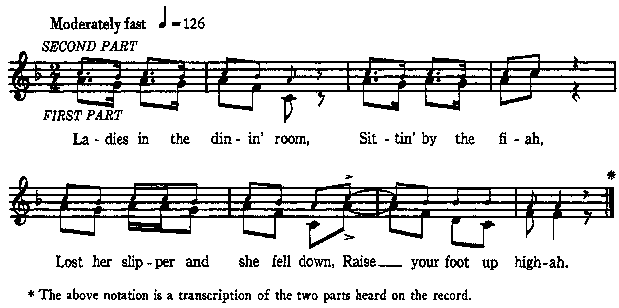
1. Ladies in the dinin' room,
Sittin' by the fi-ah,
Lost her slipper and she fell down,
Raise your foot up high-ah.
Choose the one the ring goes round,
Choose the one with money.
Choose the one they call Annie Lee,*
Kiss your darlin' honey.
[* Or the name of any one of the group of players.]
YOU TURN FOR SUGAR AN' TEA
No. 948. Annie Brewer, Montgomery, Ala., 1937.
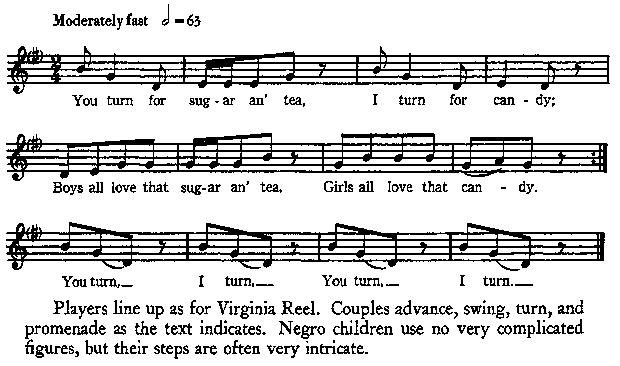
1. You turn for sugar an' tea,
I turn for candy,
Boys all love that sugar an' tea,
Girls all love that candy.
Chorus:
You turn, I turn,
You turn, I turn.
2 Some ladies love that sugar an' tea,
Some ladies love candy,
Some ladies wheel all around
An' kiss their loves so handy.
3 Miss Brown*, sure loves sugar an' tea,
Miss Brown sure loves candy,
Miss Brown sure can turn all around
And kiss her true love handy.
[* The name of any girl player.]
4 Lead through that sugar and tea,
Oh, lead through that candy,
You lead through that sugar and tea,
And I'll lead through that candy.
[* The last stanza from B. A. Botkin, The American Play-Party Song, p. 228.]
------------------------------------------------------------------
JOHNNIE BOUGHT A HAM
No. 904. Myrtle and George Pinnacle, Murrells Inlet, S.C., 1937.
"Johnnie Bought a Ham" is a clapping game played like "Peas, Porridge Hot." The Pinnacle children of Murrells Inlet, South Carolina, slap in syncopated rhythm. The climax is reached in the last three lines when they slap their partners' hands with as much force as possible, sometimes knocking them, off balance.
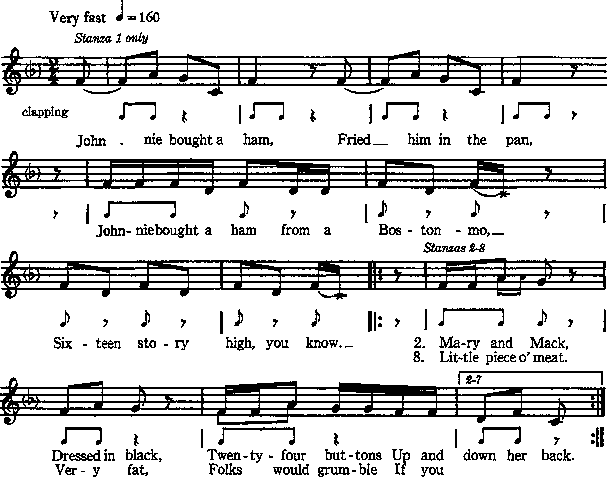
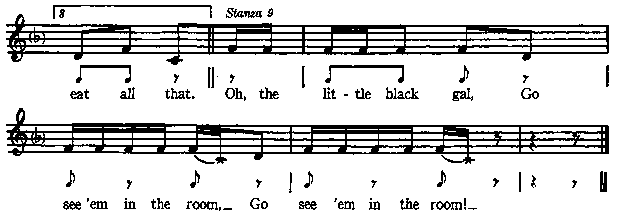
1. Johnnie bought a ham,
Fried him in the pan,
Johnnie bought a ham from a Boston-mo,
Sixteen story high, you know.
2 Mary and Mack,
Dressed in black,
Twenty-four buttons
Up and down her back.
3 Comb her hair,
Broke my comb,
I'll tell mamma
When she come home.
4 Mary Mack,
Dressed in black,
Silver buttons
All down her back.
5 Ast my mamma
For fifteen cents.
To see the elephant-ee
Jump the fence.
6 Jumped so high
Cleared the sky,
Never come back
Till the Fou'th o' July.
7 Away down
In Jaybird Town,
Folks have to work
Till the sun goes down.
8 Little piece o' meat,
Very fat,
Folks would grumble
If you eat all that.
-------------------------------------------------------------
LITTLE BIRD, GO THROUGH MY WINDOW
No. 1303. Eddie Nelson, Murrells Inlet, S.C., 1937. See JAFL, 33:945 Ne, p. 118.
It takes six children to play. Three on each side take hands and make an arch. Then, couple by couple, the children drop hands and go under the arch.
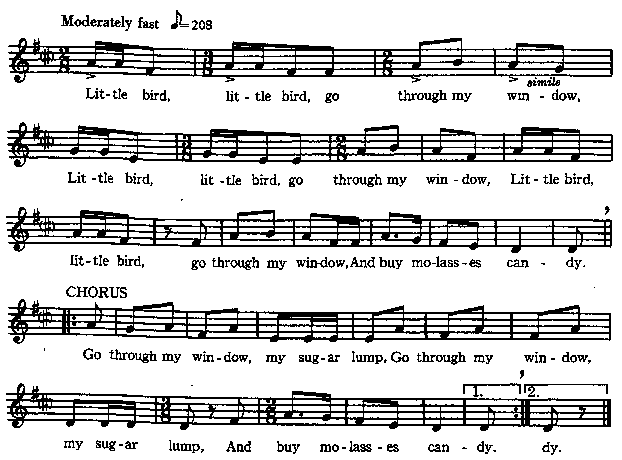
1 Little bird, little bird, go through my window,
Little bird, little bird, go through my window,
Little bird, little bird, go through my window,
And buy molasses candy.
Chorus 1:
Go through my window, my sugar lump, (2)
And buy molasses candy.
2 Blue bird, blue bird, go through my window, (3)
And buy molasses candy.
Chorus 2:
Go through my window, my little bird, (2)
And buy molasses candy.
--------------------------------------------------------------
SALLY GO ROUND THE SUNSHINE
No. 1303. Eddie Nelson, Murrells Inlet, S.C., 1937.
"I've played it different in different schools. One place we would catch hands and hold 'em up and go-in-and-out-the-window, you know. When we said 'Boom! Boom!' we would stop and catch somebody and he had to choose a partner, or sometimes we made him pay a fine.
"Then I've played it two rings, boys outside and girls inside, goin' different ways. 'Boom! Boom!' means stop and stomp your feet, and you have to take the partner you stop in front of.
"But I like it best just to have one ring and dance to the right for the sun and then to the left for the moon, then back again for the sunshine. Then stop 'Boom! Boom!' and scramble for partners. That just meant you could stand next to the girl you liked best when you played again—if you could get her, I mean."

Sally go round the sun,
Sally go round the moon,
Sally go round the sunshine,
Every afternoon,
Boom! Boom!
-------------------------------------------------
DON'T YOU LIKE IT?
No. 878. Annie Brewer, Montgomery, Ala., 1937.
Acted out by Annie Brewer, this is a prancing, teasing song with a challenge to a chase or a tussle.
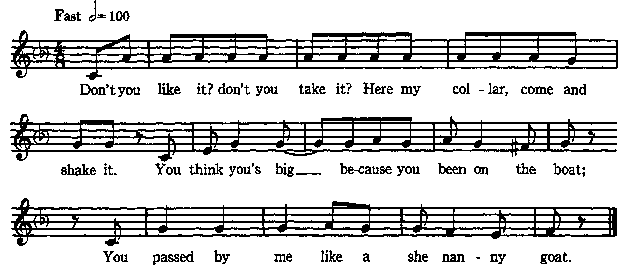
Don't you like it? don't you take it?
Here my collar, come and shake it.
You think you's big, be cause you been on the boat;
You passed by me like a she nanny goat.
-------------------------------------------------------
COCKY DOODLE DOODLE DOO
No. 58. Group of Negro girls, Kirby Industrial School, Atmore, Ala., 1934.
March or skip while singing "All around the kitchen, etc." Then stand still as indicated, while the player in the center "makes a motion" as her ingenuity or taste dictates. She may kneel, bow, prance, dance a jig, "shake it," or otherwise cavort. Sometimes the center player chooses the "motion" and other players must follow her example, must "do it like this."
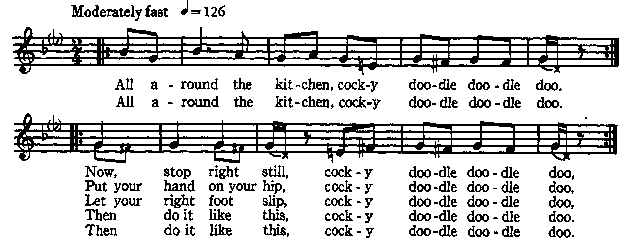
1. All around the kitchen, cocky doodle doodle doo, (2)
2 Now, stop right still, cocky doodle doodle doo,
Put your hand on your hip, cocky doodle doodle doo,
Let your right foot* slip, cocky doodle doodle doo,
Then do it like this, cocky doodle doodle doo. (2)
3 All around the kitchen, cocky doodle doodle doo, (2)
4 Now, stop right still, cocky doodle doodle doo,
Put your hand on your hip, cocky doodle doodle doo,
Let your right foot * slip, cocky doodle doodle doo,
Then do it like this, cocky doodle doodle doo.
[* Sometimes sung, "backbone," with appropriate movements.]
-------------------------------------------------------------
KITTY, KITTY CASKET
No. 88. See previous song. See Ne, p. 168.
"Kitty, Kitty Casket" is a drop-the-handkerchief play song which seems to combine parts of two ring-games, "Itisket Itasket" and "Lost My Handkerchief." In east Texas, Alabama, and Mississippi we have heard Negro school children sing:
Lost my handkerchief yesterday,
I found it today, I found it today,
It was all full o' mud and I tossed it away;
I tossed it away, an' I tossed it away.
"Tossed it away" is the signal for the player with the handkerchief to drop it behind a child in the ring. "Throwed" and "dashed" are preferred by some children. An east Texas group sings,
It was all muddied up and I dashed it away.
Dish-ma, dash-ma, dish-ma, dash-ma, dish-ma, dash-ma, etc,
the chant continuing until the chase is well under way.
Newell (Games and Songs p. 169) says that the game played in England to the tune of "A-tisket, A-tasket" is called "Drop-Glove," also in some places "Lost Letter." He cites the following American version, presumably as sung by white children at play:
A-tiskety A-taskety
A green and yellow basket,
I sent a letter to my lovey
And on my way I dropped it.
Edna Potter (This Way and That; No. 3) in her collection of game songs for American children closes her version with
A little boy came along,
And put it in his pocket.
In 1938 swing versions of the tune became popular under the title, "Atisket, Atasket." In these versions composers, singers, and arrangers used their ingenuity in setting down elaborate details about the finder of the letter as well as the desperate feelings of the loser. Though the children would not admit it, we suspected that these swing versions through the radio and the nickel-in-the-slot phonographs had influenced the east Texas group (Liberty School, Newton Texas) of little Negro girls who sang as they played Drop-the-Handkerchief:
Atiskety Ataskety
A green and yellow basket.
I wrote a letter to my lovey
And on the way I dropped it, I dropped it, I dropped it.
Yes, on my way I dropped it.
Sure, one of you have picked it up,
And put it in your pocket.
It's you, it's you, it's you, it's you!
On the other hand "Kitty, Kitty Casket," sung to us in Alabama in 1934, carries its own evidences of originality.
